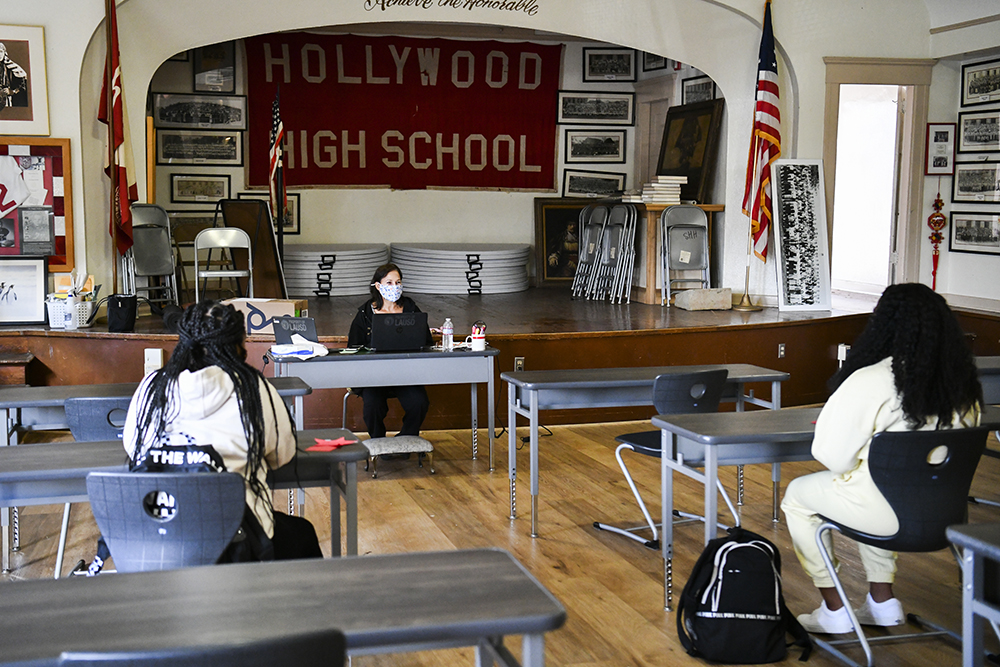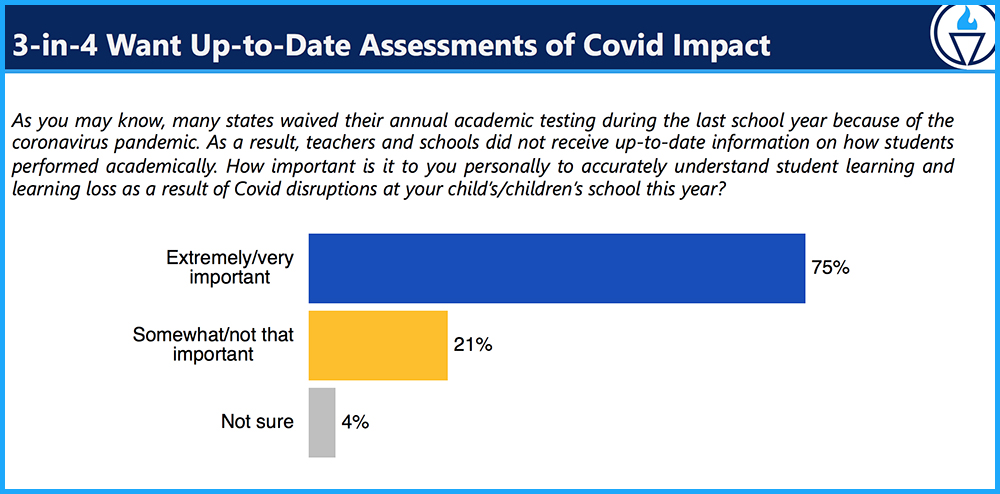The Week in COVID & Education Policy: L.A. High Schoolers Stay Home, 67% of Parents Worried about Academic Decline and More Key Updates

This is our weekly briefing on how the pandemic is shaping schools and education policy, vetted, as always, by AEI Visiting Fellow John Bailey. Click here to see the full archive. Get this weekly roundup, as well as rolling daily updates, delivered straight to your inbox — sign up for The 74 Newsletter.
Ready for Better: Why Parents Want Bold Change in K-12 Education: In a new poll of parents from Beacon Research, 67 percent said they are “very concerned” or “somewhat concerned” that the COVID-19 crisis has negatively affected their child’s academic growth.
- 3 in 4 say they want up-to-date information on student learning.
- “Overwhelming majorities of parents want states to be transparent about how the education stimulus money is being used, and provide updates on the new funding’s impact on student performance.”
- Read the blog post; read the full report.
May 14, 2021 — The Big Three
FCC to help families with broadband, device costs: The Federal Communications Commission officially opened the Emergency Broadband Benefit Program for enrollment. More than 800 broadband providers are participating. The program offers:
- Up to a $50-a-month discount on service and associated equipment
- Up to a $75-a-month discount on for households on tribal lands
- A one-time discount of up to $100 on a tablet, laptop or desktop computer
- How we got here: How Internet Inequity Persisted Through 4 Presidents and Left Schools Unprepared for the Pandemic

California: Most Los Angeles high schoolers are staying home
- Only 7 percent of Los Angeles Unified School District high school students have returned to reopened campuses, far less than expected. About 30 percent of elementary school children have returned, and 12 percent of middle school students.
- “Many in communities hard-hit during the winter surge are not sufficiently reassured that schools are safe. Others have told the Times they were put off by safety practices they consider unnecessarily extreme, especially in middle and high schools. And some parents and students said they were hesitant or unable to disrupt ongoing routines so late in the school year, which ends June 11.” Read at Los Angeles Times.
New research: Children are not COVID-19 ‘superspreaders,’ Brazilian study finds.
- “In our setting, children do not seem to be the source of SARS CoV-2 infection and most frequently acquire the virus from adults. Our findings suggest that in settings such as ours, schools and child care potentially may be reopened safely if adequate COVID-19 mitigation measures are in place and staff are appropriately immunized.”
- “Our findings demonstrate that most frequently, children acquire infection from adults, rather than transmitting it to them.” (Read the study)
Federal Updates
Vaccine Approved for 12-15-Year-Olds: On Monday, the FDA approved the Pfizer vaccine for 12-15-year-olds. On Wednesday, the CDC’s Advisory Committee on Immunization Practices’ panel also endorsed the vaccine. (Yes: 14; No: 0; Recused: 1 because of conflict of interest).
- Vaccine hesitancy: “A recent Kaiser Family Foundation survey found that less than a third of parents say they are willing to get their child vaccinated immediately,” The 74 reported this week.
- “Over the coming days and weeks, there will be TV ads, social media campaigns and events with ‘celebrities and influencers who have the ability to reach out to teens and their parents.’ The White House declined to preview who these celebrities might be,” NPR reports.
- Related: School Districts Get Creative Promoting Vaccine to Teens
Homework Gap: The FCC voted unanimously on the order for allocating $7 billion homework gap funding through the E-rate program.
- The vote likely means the program will open in early July.
- The final version made an important change from the draft proposal. First, districts will be able to apply for purchases made for the upcoming school year during the first application window. After this initial application window, a second window will be opened, and funds that remain can be used to reimburse districts for expenses incurred since the beginning of the school closures (March 1, 2020 to June 30, 2021).
USDA Distance Learning & Telemedicine Grant Program (DLT): Is awarding grants ranging from $50,000 to $1 million to organizations supporting distance learning and telemedicine in rural communities. The deadline for this competitive grant program is June 4. See the fact sheet.
U.S. Treasury: Released $350 billion in Coronavirus State and Local Fiscal Recovery Funds. Read the interim final regulation. These funds can be used to support a wide variety of community and education projects, among other uses.
COVID-19 Research
COVID Cases in San Francisco: San Francisco Unified School District reported only 20 cases have been recorded among the 20,000 staffers and students who have returned to elementary schools since the district reopened for in-person learning three weeks ago.
- “In other words, zero cases were related to in-school transmission at SFUSD,” the city Department of Public Health said in a statement. “There were no cases among vaccinated teachers and staff” in the school district.
School Reopenings, Mobility and COVID-19 Spread: Evidence from Texas in a new NBER paper finds “reopening Texas schools gradually but substantially accelerated the community spread of COVID-19.”
- “In Texas, reopenings often occurred alongside high community spread and at near capacity, making it difficult to meet social distancing recommendations.”
- “Results imply that school reopenings led to at least 43,000 additional COVID-19 cases and 800 additional fatalities within the first two months.”
- However: “We then use SafeGraph mobility data to provide evidence that spillovers to adults’ behaviors contributed to these large effects. Median time spent outside the home on a typical weekday increased substantially in neighborhoods with large numbers of school-age children, suggesting a return to in-person work or increased outside-of-home leisure activities among parents.”
Transmission Occurs at Home, Not Schools: New study finds most transmission occurred within households, not at places of work (or schools):
- “The evidence suggests that ‘households show the highest transmission rates’ and ‘are high-risk settings for the transmission’ of [COVID-19]. Schools, businesses and other organizations implemented a range of prevention protocols — from adjusting airflow to installing physical barriers to monitoring compliance to administering their own testing services — that households did not, and perhaps could not.”
- “On an hourly basis, the schools studied were more than four times as safe as the places frequented by students and staff when not in school.”
School Closures in Germany: A new study finds school closures did not contain the spread of the coronavirus in Germany.
- “In line with our results on school closures, we find concerns about the return to full-schooling capacity after the summer holidays to be unsubstantiated. Infections among children and adults did not rise with the start of the new academic year.”
- “Instead, infections appear to have increased in the last weeks of the summer holidays and declined in the days after reopening.”
City & State News
Virginia: The state announced $62.7 million in Virginia LEARNS Education Recovery grants. Funds can be used for:
- Increased in-person instruction and small-group learning
- Targeted remediation, extended instruction and enrichment
- Strategic virtual learning, technology and staff training
- Social-emotional, behavioral and mental health supports for students and staff;
- Alternate learning opportunities
- Student-progress monitoring and assessment
Washington: State health leaders said K-12 schools should prepare for full-time, in-person learning this fall.
Maryland: A COVID testing program is helping Baltimore City school system track and contain infections.
North Carolina: House Bill 934 would create the Student Success Program. Eligible families would receive $1,000 per student, up to $3,000 per household. They can spend the funds on things like summer learning or afterschool programs.
Texas: New Dallas ISD Hybrid School to offer mix of in-person and virtual learning
Viewpoints
Impact of COVID-19 on Parents’ Education Spending: New report from Tyton Partners and Walton Family Foundation.
- Parents and caregivers took greater responsibility for school decision-making during the pandemic. More than 15 percent switched their child’s school for the 2020-21 academic year, which is estimated to be 2.5 times more than pre-pandemic.
- School enrollment shifted, with public and private schools experiencing an estimated decrease of 2.6 million students; charter schools, homeschooling, learning pods and microschools all saw net increases.
- Households spent an estimated $20 billion more on an annualized basis on education-related activities, primarily stemming from the emergence of supplemental learning pods.
- Limited awareness of, and access to, alternative and emerging learning models significantly hindered parent agency, particularly for those at lower-income levels. (Read the report)
Summer Learning and Beyond: Opportunities for Equitable Learning Postpandemic: A new report from the Learning Policy Institute offers six principles for creating “intellectually rigorous and equitable learning settings”:
- Center relationships
- Create a culture of affirmation and belonging
- Build from students’ interests and take a whole-child approach to their development
- Engage students’ and families’ knowledge in disciplinary learning
- Provide creative, inquiry-based forms of learning
- Address educator needs and learning (Read the guide)
A Misleading CDC Number: David Leonhardt touches on camps and schools in The New York Times:
- “When the Centers for Disease Control and Prevention released new guidelines last month for mask wearing, it announced that ‘less than 10 percent’ of COVID-19 transmission was occurring outdoors. Media organizations repeated the statistic, and it quickly became a standard description of the frequency of outdoor transmission.”
- “In truth, the share of transmission that has occurred outdoors seems to be below 1 percent and may be below 0.1 percent, multiple epidemiologists told me. The rare outdoor transmission that has happened almost all seems to have involved crowded places or close conversation.”
- “Saying that less than 10 percent of COVID transmission occurs outdoors is akin to saying that sharks attack fewer than 20,000 swimmers a year. (The actual worldwide number is around 150.) It’s both true and deceiving.”
- “[CDC officials] continue to treat outdoor transmission as a major risk. The CDC says that … summer camps should require children to wear masks virtually ‘at all times.’”
WorkRise: Will invest up to $2.5 million to support rigorous research that advances knowledge of strengthening economic well-being and accelerating economic mobility for workers earning low wages, particularly employees of color and others who have been disproportionately affected by the COVID-19 economic crisis.
Catholic Schools Are Losing Students at Record Rates, and Hundreds Are Closing: Pandemic-fueled economic woes exacerbate schools’ challenge. “At least 209 of the country’s nearly 6,000 Catholic schools have closed over the past year, according to the National Catholic Educational Association.” Read at The Wall Street Journal.
Don’t Ban Virtual School. Improve It: Via Michael Horn in Education Next
Hop, Skip, Leapfrog: A new resource from The Learning Accelerator explores ways schools and systems pursued student-centered innovation during COVID-19. Great list of examples and resources based on “hops” (small changes), “skips” (medium-size changes) and “leaps” (big, structural changes). (Read the guide)
… And on a Lighter Note
Last weekend, we celebrated mothers: A dad’s post-game press conference reviews some of the day’s failures.
@dumbdadpod Hate doing these but it’s part of the deal.. #dumbdad #dadspressconference #sportcentertop10 #parentingmistakes #parentinghumor #coachdad
ICYMI @The74
Weekend Reads: In case you missed them, our top five stories of the week:
- Reopening: Returning this Fall, By Popular Demand: Virtual School. For Communities of Color, it’s Largely a Matter of Trust (Read more)
- Vaccines: As FDA Approves Shots for Youth 12 and Up, School Districts Get Creative Promoting Vaccine to Teens (Read more)
- Learning Loss: Learning to Cut Hair — at Home: How Remote Classes Forced Career Technical Students to Lose Hands-On Skills Classes During the Pandemic (Read more)
- Student Voice: How Neil deGrasse Tyson Showed Me the Wonders of the Universe, Inspired My Career and Got Me Through the Pandemic (Read more)
- Summer School: Designing Fun-Filled Summer Learning Programs That Students Will Want to Attend (Read more)
Disclosure: John Bailey is an adviser to the Walton Family Foundation, which provides financial support to The 74.
Get stories like these delivered straight to your inbox. Sign up for The 74 Newsletter

;)

